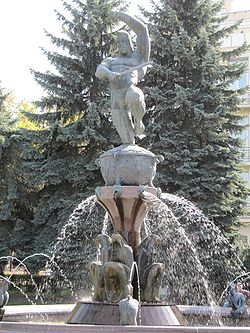Sosruko
This article needs additional citations for verification. (January 2010) |


Sosruko, Sosruquo, or Sosriqwa (Ossetian: Сослан, Soslan; Kabardian: Сосрыкъуэ, Sosryqwa; Karachay-Balkar: Сосурукъ/Сосуркъа, Sosuruq/Sosurqa) is a central character in many cycles of the Nart sagas of the Caucasus.
Sosruko is a powerful but devious man who is the smallest of the Narts; as a character, he is sometimes cast in the light of the trickster god, comparable to the Scandinavian Loki (who finds a closer parallel in the Nart , however), Georgian Amirani, or the Ancient Greek Prometheus. It is possible that at least in the latter case, Sosruku served as a direct inspiration.
In Circassian mythology, it was the Nart Sosriqwe, minion of the gods and his doting mother, Lady Satanaya, who stole fire from the giant.
Etymology[]
The name etymologically came from Turkic languages: Nogai suslan- "to look menacing", suslä "menacing, gloomy" (hence Ossetian: Soslan). The variants Abkhazian: Sasərqwa, Adyghe: Саусырыкъо [saːwsərəqʷa], Kabardian: Сосрыкъуэ [sawsərəqʷa], Ubykh: [sawsərəqʷa], Digor Ossetian: Sosruqo, Sozyryqo, Sozuruqo. The name Sosruko [saːwsərəqʷa] is from Circassian sa "sword" + wa "hit" + sər "heat" + qʷa "son"; hence literally “The son of the fiery sword hit”.
References[]
External links[]
- Nart Tales of the Circassians - Reocities personal page
- The Circassian Nart Epos - International Centre for Circassian Studies
- Trickster gods
- Caucasus
- Circassians
- Circassian mythology
- Ossetian mythology
- Mythological characters
- European mythology stubs